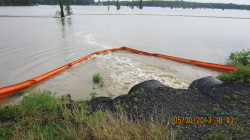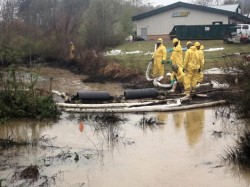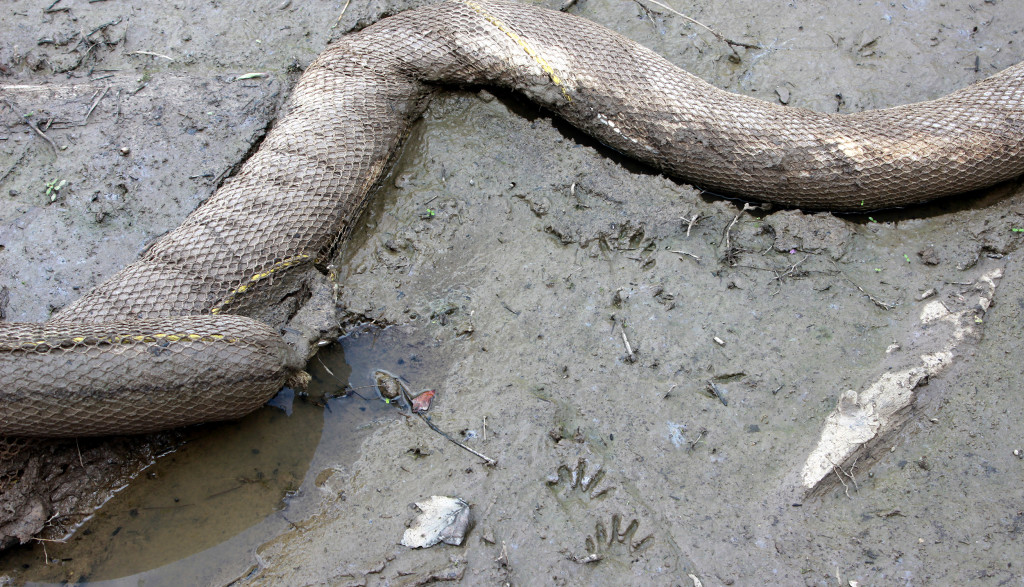©Scott Sines, The Green Rocket News
The lily pads and vegetation are gone. In their place are containment booms, mud, and foil pie pans tied to trees, to discourage birds from landing on the water. As Genieve Long and Alyssa Martinez slog through the muck, the water filling their bootprints turns from brown to black. It’s diluted bitumen (dilbit) oil, that started in Canada and landed March 29, 2013, in a small cove just off Lake Conway in Mayflower, Arkansas.
The Pegasus Pipeline, sixty-five years old, had ruptured spilling somewhere between 200,000 to 300,000 gallons of diluted bitumen, the heaviest petroleum product coursing through the country’s network of pipelines.
A peanut butter thick mixture of oil and sand, bitumen must be diluted to pump through a pipeline. Oil companies use a combination of liquids, including Benzene, a known carcinogen, as dilutents. When dilbit spills into water, the dilutents evaporate, the tar sands return to their peanut butter texture and drop to the bottom, suffocating aquatic life. The hazardous health effects of dilbt are well known. Cleanup procedures are not.

Exxon agreed releasing a statement in April that, “… The main body of Lake Conway remains oil free…”

Exxon quickly opened its wallet.
They brought in a doctor to evaluate the sickened students. “The doctor explained that some students would have greater sensitivity than others, but because of the air tests done, there was no cause for alarm,” Principal Candie Watts told Reuters at the time. According to its newsletter, Exxon gave the school $15,000 for a graduation party, playground upgrades, computers and an electronic sign. Another $30,000 donation will equip science and math labs, and provide for teacher training in the middle and high schools.
The company also moved quickly to contact residents of the North Woods subdivision who had evacuated to hotels. Generous estimates of living costs were gathered and checks were cut. If the checks were bigger than expenses, Exxon told homeowners to keep the change. The company even bought a lift chair for one homeowner’s mother-in-law.
Local police, sheriff’s officers and volunteer firefighters were offered extra work as security guards. They received $300,000 for their efforts. Employment ads ran on craigslist for locals to earn money doing contract work on the cleanup. According to its newsletter, Exxon gave the city $9,500 for their use of City Hall in the early days of the spill. Another $7,500 was sent to the annual “Toad Suck Daze” which benefits Faulkner County college students. The Fourth of July celebration got $1,000.

He supported $5 million in sequestration cuts to the Pipeline and Hazardous Materials Safety Administration. He voted against subjecting Canadian tar sands oil to the 8 cents per barrel tax that supports the Oil Spill Liability Fund, used to pay for spill cleanups. He voted against a measure requiring oil and gas companies to have “worst case” disaster plans in place in case of a spill.
Exxon’s largesse was badly needed and gained the loyalty of many as businesses boomed. At Stroud’s Country Diner, a chorus of waitresses echoed the sentiment of owner Jerry Stroud that the spill was a “gift from God,” declaring that “we could use another one.” The place was packed for breakfast, lunch and dinner. Exxon used a side parking lot as a staging area.

State Attorney General Dustin McDaniel contracted with Witt O’Brien’s, an environmental consulting firm, to help co-ordinate cleanup efforts and provide an independent analysis. The firm has been involved in major spills from the Exxon Valdez, to the BP Deepwater Horizon, to the Kalamazoo (MI) River. It has a checkered record.
O’Brien’s had the contract to cleanup the dilbit spill in the Kalamazoo River.

The Arkansas Dept. of Environmental Quality has hired The Center for Toxicology and Environmental Health, a North Little Rock firm, to conduct independent analysis of air and water quality. CTEH has its own controversial past. A New York Times report on CTEH’s work on the BP Deep Horizon spill, indicates that the firm goes out of its way to satisfy its employer. “There is a huge incentive for them to under-report the size of the spill,” said Nicholas Cheremisinoff, a former Exxon chemical engineer in the NYT report.
Still, money talks. Mayor Randy Holland, Lt. Gov. Mark Darr, Judge Allen Dodson and Exxon all agree that six months after the Pegasus Pipeline rupture, the air and water tests from CTEH show that the cleanup by Witt O’Brien’s has progressed sufficiently to move the effort from emergency to remedial status. Now, the cleanup effort, which was pulling resources from a group of local, state, federal, and Exon staff, moves to one agency, the Arkansas Department of Environmental Quality.
Not everyone agrees with the change in status. Members of the Faulkner County Citizens’ Advisory Group say more independent testing is needed. The group has its own independent study that contradicts Exxon’s findings, as well as an inventory of personal medical problems since the spill. All related to chemicals associated with oil.
City officials are moving forward despite the study and personal histories. Residents are now allowed to move back into their homes. Only a few have returned. Some have left town. They point to the platting and  planning maps of the subdivision where the pipeline easement is clearly marked for gas, not oil. The Pegasus pipeline was not the only thing that ruptured in Mayflower that March day. So did the trust between homeowners and the city.
planning maps of the subdivision where the pipeline easement is clearly marked for gas, not oil. The Pegasus pipeline was not the only thing that ruptured in Mayflower that March day. So did the trust between homeowners and the city.
Judge Dodson thinks that the cove by the lake has been largely cleaned up. “Eventually it will go back to the way it was,” Dodson said. Meanwhile, in the backwater of the cove, a sheen covers the water and oil is clearly visible along the booms, along the shore, and in the mud. Genieve Long and Alyssa Martinez, a geology student from the University of Arkansas at Little Rock, pull on their hip waders, put on their respirators and take samples of the water and muck. They’re on a mission.
And the sleepy little town is divided over issues it never expected to face.
Residents of North Woods, and in the small cottages and mobile homes near the cove and lake, wait and worry. Those who have fished the lake for years use their lifelong knowledge of the lake, and know things are not near right.

Mayflower’s a place where everybody knows everybody, and their business. The sudden influx of cash for some, and loss of homes and lifestyle for others, has neighbors taking sides. Tensions are rising. All over a pipeline they didn’t even know existed.











